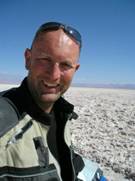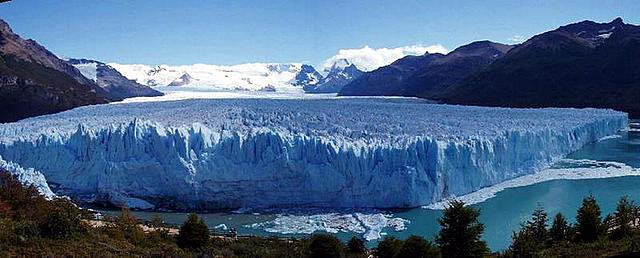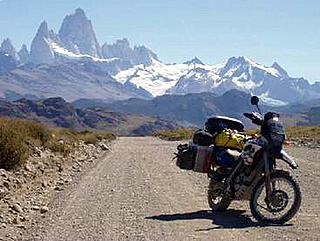Trip duration: 40 days
Trip miles to date: 5,160
Miles
since last update: 2,080
 It’s been an eventful few days since
the last update. I’ve travelled over 2,000 miles, crossed 2
borders, crashed on the notorious Ruta 40, slept in the shadow of a
glacier, been interviewed by Argentine TV and met some fascinating
fellow travellers along the way.
It’s been an eventful few days since
the last update. I’ve travelled over 2,000 miles, crossed 2
borders, crashed on the notorious Ruta 40, slept in the shadow of a
glacier, been interviewed by Argentine TV and met some fascinating
fellow travellers along the way.
From Puerto Natalès (last update) there is
no road route north through Chile. You can either take a 4 day ferry to
the Island of Chiloè, some 500 miles north or opt to do what
I did and head back into Argentina. First stop was a visit to the
Moreno Glacier National Park, just outside the busy tourist and
backpacker town of El Calafete. This also marked the beginning of the
notorious Ruta 40, a thin strip of dirt track that slithers down the
western side of Argentina and the subject of numerous messages of
warning and disasters from fellow travellers both prior to arrival and
after.
The Glacier itself was stunning (see photo below),
although the park itself was extremely busy with numerous bus trips
from Calafete. Rather than find space in the town I elected to camp in
the park, in the shadow of the glacier, allowing me to rise early and
watch the sunrise light up the face. This experience is simply not done
justice by the photo above.

Back onto the Ruta 40 north to visit El
Charltèn, an Argentine equivalent to the Torres del Paine
range in Chile. Early in the day I spotted the dust clouds and
silhouettes of 2 bikes coming towards me. Each of us slowed down and we
exchanged greetings in the middle of the road, in the middle of
nowhere! They were Kevin and Julia Sanders, a couple I had read about
and had visited their website (http://www.globebusters.com/)
before coming to South America. They were on route to Ushuaia after
starting in Vancouver, a trip not so different of my own. We parted
promising to meet again in Alaska.
El Charletèn is a pretty, almost Alpine
looking town sitting in the shadow of Mt Fitzroy, a 3,400 metre peak of
granite dominating the skyline. I was only stopping for lunch but I
bumped into Mad Marco from Germany, who was currently stuck in
Charltèn as the forks on his Honda Africa Twin had
permanently destroyed themselves.
 That afternoon I headed for
Tres Largos which, according to the map, would be a seemingly sensible
place to stop for the night. I pulled into the gas station there at
about 4.30 and met a group of Germans heading south. Now, for some
reason I’m growing weary of travelling Germans. This a completely
unreasonable and irrational assumption I know, but after several
comments (all negative) about the preparation and condition of my bike
(for example “your chain sprockets are about to
expire” and “why is your seat set so
low?” and “ugh, why are you using that GPS
unit?”) I mentioned that I was going to look for somewhere to
stay the night in Tres Largos.
That afternoon I headed for
Tres Largos which, according to the map, would be a seemingly sensible
place to stop for the night. I pulled into the gas station there at
about 4.30 and met a group of Germans heading south. Now, for some
reason I’m growing weary of travelling Germans. This a completely
unreasonable and irrational assumption I know, but after several
comments (all negative) about the preparation and condition of my bike
(for example “your chain sprockets are about to
expire” and “why is your seat set so
low?” and “ugh, why are you using that GPS
unit?”) I mentioned that I was going to look for somewhere to
stay the night in Tres Largos.
I grant them that Tres Largos was little more than a
gas station in the middle of a rock desert, but I wasn’t
expecting the vehement “NEIN! There is NOTHING in Tres
Largos! You MUST carry on and stay where we stayed last
night” (an estancia some 100 miles further on). I should have
taken note that by 4.30pm, they were in the same location as I was
expected to be by that evening. That alone should have warned me of the
condition of the upcoming stretch of road.
On top of this, Tres Largos represented the last
opportunity for petrol until Bajo Caracoles, some 230 miles north. This
is at the absolute maximum of the Beemer’s tank range so I
filled my spare 10 litre container in preparation. Against my better
judgement and contrary to how I felt physically after a full
days’ riding, I set out for the Estancia Angusteria. Within
50 miles I had crashed severely.
Now on dirt tracks it’s a common technique to
apply speed to even out the inconsistent surface. At slow speeds the
bike becomes nervous, twitchy and more difficult to control – a
condition that gets steadily worse from the feedback from an
increasingly nervous rider as he / she grips the controls more tightly.
This “application of speed” approach is good for 99
times out of 100, but of course, it’s the 1 time out of 100
that will bite you, and at 60 mph accidents will happen quickly and
most likely hurt more.
Up to this point of the trip I had been really enjoying
the dirt tracks and that afternoon I was travelling at about 50 to 60
mph. In reality this was about 10-20 mph too fast for the road
conditions (coupled with my weary condition.) The track had
deteriorated and I’d failed to reduce my speed. This particular stretch
was comprised of fist-sized rocks that had accumulated into deep ruts
by the heavy trucks that use this route.
I always find it interesting that accidents and crashes
take an infinitesimally small amount of time for you to pass beyond the
point of no return (otherwise you’d react and there would be no
accident, right?). However, once you’re past that point everything
slows down. My memory of what led up to the accident is therefore
slight, I suspect that the front wheel tried to rise up out of the rut,
probably following a wheel track from a previous vehicle that had
changed lane. The back wheel probably declined to follow this example
and stayed in the rut, the bike fish-tailed violently and I failed to
correct it (even if I could). Minor fish-tailing happens all the time,
and it’s part of the enjoyment of riding dirt-tracks that they usually
come back, but I distinctly remember thinking “oh shit! This
ones not coming back… the bike swapped sides a couple of
times (known as a tank slapper as the bars are violently swapped from
side to side). I was then unceremoniously spat off the top of the bike,
over the bars, as the front wheel dug into the track and the bike
flipped over frontward.
That’s where things really slowed down.
Flying through the air I knew that at this speed, this would be a
severe crash and things were about to get hurt. I also remember
considering the fact that I could not afford to break anything (i.e.
leg, arm or neck) as I was a long way from anywhere and this was not a
busy road.
The initial impact was HARD!!! but I realized that I
had survived it and I tucked everything in as best I could…
far, so good. The next thing to enter my head, and I remember it
vividly, was “well, the only thing that can kill me now is
the bike landing on top of me!” So as I was still rolling I
was looking back at the bike as it nosedived into the track, and
skidded to a stop about 20 feet short of me.
There must be a common 10-second rule, as the first
thing you want to do after an accident is leap straight to your feet.
I’ve watched track racers try to stand up while they are
still rolling at 20 mph (!) and I did the same. Patting myself down I
could hardly believe that I was in one-piece. I had taken the initial
impact on my shoulder and hip, both which were talking to me in
protest, but everything else was fine. RELIEF!
Looking back down the road the same could not be said
of the bike. I regret I did not have the presence of mind to take
pictures (forgive me!) but I saw a sorry sight of the bike lying on the
gravel with all the luggage spread down the trail for about 30 metres.
Time to take off the gloves, the crash helmet, the back pack and the
jacket and just take a moment or two – this was obviously
going to take a little time to fix.
From an initial appraisal, the worst issue seemed to be
the aluminium Touratech panniers. Both had been stripped from the bike
and the left hand box had completely burst – what was left was a
mangled mess. The left-hand side of the handle bars were bent down and
the foot-peg bent under. The headlight had rattled loose in the
fairing, the pannier frame was badly bent and was fouling the chain
guard, the mirrors were stripped off and the left-hand indicator
broken.
Slowly I began to reassemble the components. I pulled
the handlebars back into shape by bracing my foot against the engine
guard. Then, by grabbing several boulders from the side of the road to
use as a hammer and anvil, I began to bash things back into some sort
of shape – starting with the pannier frame. It took 2 exhausting hours
before I was fit again to move. The left-hand pannier box was held
together by tape and a strap. In that time, only 4 vehicles passed
reminding me how lucky I had been not to be hurt myself.
I still had 50 miles to the Estancia that the Germans
were so keen about, it would take me a further 2 hours to cover this
distance and the road got much worse both with the failing light of
dusk and my general feeling of depression following the crash.
I found the Estancia almost by luck, it was placed 10
miles off of the main road, signposted by a small, unlit sign. I was
greeted warmly and enthusiastically and shown a modest room and told
that if I wanted food, a cordeo (barbequed lamb) was just being served
outside. I merely dumped my bags and followed him outside, still
wearing my dusty riding gear. I found a small gathering of the family
accompanied with 3 Argentine documentary makers, interviewing the rural
locals about how the world has changed for them.
It was a charming meal – little understood by
me as my Spanish is still not good enough, but I enjoyed the food, and
shared the last of my malt whisky. It felt like a good way to finish
the day. The film crew interviewed me and seemed interested how a lone
Englishman on a motorcycle could have stumbled on this place.
I awoke incredibly stiffly. The shoulder and the hip
screaming in recognition of what they had gone through the previous
day. A couple of Ibuprofen and some strong, hot coffee saw me straight
and I was back on the road (filmed as I left).
After I re-crossed the border with Chile, the next few
days were spent in first Cochrane and then Cohyique. In the latter I
found a local mechanic to re-shape the pannier boxes into approximate
shape – and the results were remarkable. So back onto the
Carratera Austral (the spindly dirt-track road built on the
instructions of General Augustine Pinochet) and an observation that the
Chileans take far better care of their dirt-roads than the Argentines.
I stopped for the night at the luxurious fishing lodge at El Parque,
just north of Purto Puriguapi, and a welcome evening of relaxation
after a tough few days.
The next day would get me to Chaitèn, the
stepping off point to the Isla Grande de Chiloè. To continue
north, most tourists and travellers head back into Argentina and drive
north from San Carlos de Bariloche. I, however, have always wanted to
visit Chiloè so I was excited to leave the main tourist
route. The ferry was to leave at 9am so dutifully I was sitting on the
ferry embarkation slipway at 8.45am the following morning. I was
seemingly the only person not to know that the ferry NEVER, EVER leaves
on time. After 1 hour, news filtered that it would be 12 noon, at
least, before the ferry arrived. Of more concern was the phase
“well, if not 12 noon, it will definitely be today at
least”. I decided to cut loose and ride out to the end of the
road, some 40 miles away, at Caleta Gonzalo. The ride was pretty and
the coffee from the café at the end of the road made the
trip worthy. I later found out that this was part of Doug Tompkins (the
US billionaire and philanthropist) vast nature reserve.
After racing back to catch the ferry perhaps
predictably an empty slip-way welcomed me. I took encouragement from
the fact that many locals were now attending – perhaps signifying
promise. The ferry eventually arrived at 2pm, and as a consequence we
arrived in Castro, the large port town in the middle of
Chiloè, at 9.30pm. For a change, I was let off first
(motorbikes are usually last) so I had a head start to finding a hotel
(boy, the beer tasted GOOOOD!)
I’ve decided to get to Santiago quickly and
to get the bike fixed up and better prepared for the challenge of the
Atacama Desert and the altitude and isolation of Bolivia. I’m
currently in Tecumo, about 400 miles south of Santiago and late
yesterday afternoon, having found suitable replacements, I got the
tyres replaced. Santiago is just 1 days ride from here and it’s smooth
tarmac all the way. Perhaps, after the last few weeks of intensely
rough tracks and the crash on Ruta 40 this is all the bike (and I) are
fit for at the moment.
If you want to know more about Greg’s
travels, visit his website at: http://www.unbeatentrack.com/




 It’s been an eventful few days since
the last update. I’ve travelled over 2,000 miles, crossed 2
borders, crashed on the notorious Ruta 40, slept in the shadow of a
glacier, been interviewed by Argentine TV and met some fascinating
fellow travellers along the way.
It’s been an eventful few days since
the last update. I’ve travelled over 2,000 miles, crossed 2
borders, crashed on the notorious Ruta 40, slept in the shadow of a
glacier, been interviewed by Argentine TV and met some fascinating
fellow travellers along the way. 
 That afternoon I headed for
Tres Largos which, according to the map, would be a seemingly sensible
place to stop for the night. I pulled into the gas station there at
about 4.30 and met a group of Germans heading south. Now, for some
reason I’m growing weary of travelling Germans. This a completely
unreasonable and irrational assumption I know, but after several
comments (all negative) about the preparation and condition of my bike
(for example “your chain sprockets are about to
expire” and “why is your seat set so
low?” and “ugh, why are you using that GPS
unit?”) I mentioned that I was going to look for somewhere to
stay the night in Tres Largos.
That afternoon I headed for
Tres Largos which, according to the map, would be a seemingly sensible
place to stop for the night. I pulled into the gas station there at
about 4.30 and met a group of Germans heading south. Now, for some
reason I’m growing weary of travelling Germans. This a completely
unreasonable and irrational assumption I know, but after several
comments (all negative) about the preparation and condition of my bike
(for example “your chain sprockets are about to
expire” and “why is your seat set so
low?” and “ugh, why are you using that GPS
unit?”) I mentioned that I was going to look for somewhere to
stay the night in Tres Largos. 